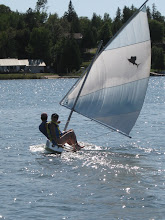I was reading an article for class about the piano's dominance in the mid 19th century and was struck by one of the arguments. For the most part the article addressed the growing popularity of the piano at this time and attributed it to growing literacy in the working class in New England and other fairly interesting ideas.
However what struck me was the use of the piano as a historicizing instrument. It was during this time that quite a bit of key board music from the baroque and classical period was brought back into the realm of performance. This is not surprising as the romantic period in general (not just musically) had a certain obsession with the past. However for me it called into question the way that we perform and study "classical" music now. (The scare quotes are because the time period of classical and the notion of classical music that we have ore really not quite the same thing, however I lack the vocabulary to find a more suitable word to cover the formal music canon of western Europe and later the united states)
It seems that the mid 19th century represented a flip in the way that we study and perform music. Simply: we used to study music of past masters and perform contemporary music. One would simply not go out to hear Bach or Handel (Handel some, I guess)while you could go out and hear the latest work of Mozart. One certainly would not go hear Dufay or Tallis. However if you studied music to write it you knew all about these people. The performance realm however, whether in private salons, or later in Vienna in public theaters was of the latest music that was written.
Now the most avantegarde "classical" music that is being written is virtually unknown to the public, in fact the only place to really access it is in the classroom. Instead we go to the concert hall to hear the work of past composers.
I know that my argument fails to take main stream music trends into consideration. This is something that I will need to continue wrestling with, trying to judge where it falls in comparison with everything else. (a strictly historical judgment, not aesthetic at all)
Anyhow that is a brief summery of ideas that struck me as a result of a mediocre class, I guess it's not too mediocre if it made me think.
Side note, I bought myself two books today!
This is Your Brain on Music, The Science of a Human Obsession by Daniel J Levintin
and on a lighter note
Fortissino, Backstage at the Opera with Sacred Monsters and Young singers by William Murray
Roblox Boys Cothes Free Template
4 years ago

2 comments:
Part of the problem with much contemporary formal music, is that it lacks comprehensibility. Except for Philip Glass, which one might deride for being boring. Yet at least he by and large wrote music people can listen to without being immediately assaulted. With him, it is a war of attrition. Notably, one often has the chance of meeting someone who has heard Philip Glass or know of him, if for no other reason than his movie music.
Note: I myself do like Philip Glass, some of his work much more than the rest, but recognize how many might find it tedious or boring.
Satellite radio is making contemporary composers more accessible, however like Duff, I find them to often be either assaultive or tedious and turn back to my tried and true classical streams from the past. Perhaps, Embly, you could, in your musical career, help bring innovative beauty into current composition. It is as if the current composers create a skeleton and instead of fleshing it out musically they just keep rearranging the bones.
Post a Comment